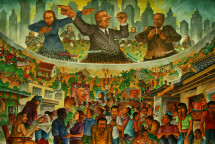This essay explores farmer and non-farmer responsibility to each other in the United States. At the nexus of this mutual dependence is a tenuous contract, straining against the chronic crisis of overproduction. This old secret crisis of surplus, coupled with the crisis of its own invisibility (hidden by assertions of scarcity), and the new enclosures and markets created in the wake of overproduction’s destructive impacts, all comprise the engine of late agro-capitalist expansionism. Drawing upon archival research at the US Department of Agriculture’s National Archive Library Special Collections, this paper chronicles the origin of this contract, which forms the basis for US agricultural policy, specifically the Farm Bill.
This contract between farmers and non-farmers was leveraged through the federal government but was compromised from the beginning by the originary coloniality of US agriculture (Mignolo 2007, Graddy - Lovelace 2016). As Carolyn Finney punctuated her Plenary Remarks at last weekend’s Dimensions of Political Ecology conference at University of Kentucky: “All. This. Land. Was. Stolen.” The contract eroded over the course of the 20th century, subsumed by these foundational contradictions, which currently flare as cognitive dissonance regarding labor (xenophobia amidst labor shortages), ecology (deregulation amidst climate change-induced disasters), trade (one-eyed fixation on exports), and social discriminations (ongoing racism and patriarchal heteronormativity amidst rise in diverse growers). But it is worth excavating the attempt at this core social contract between farmers and non-farmers, extricating it from the ethno-nationalism at work in dominant farm policy, exemplified by the American Farm Bureau Federation. It is worth recognizing the core agrarian honesty of this mutual responsibility — and the risks of dodging it.
This paper was presented at the Emancipatory Rural Politics Initiative (ERPI) 2018 Conference: "Authoritarian Populism and the Rural World"

